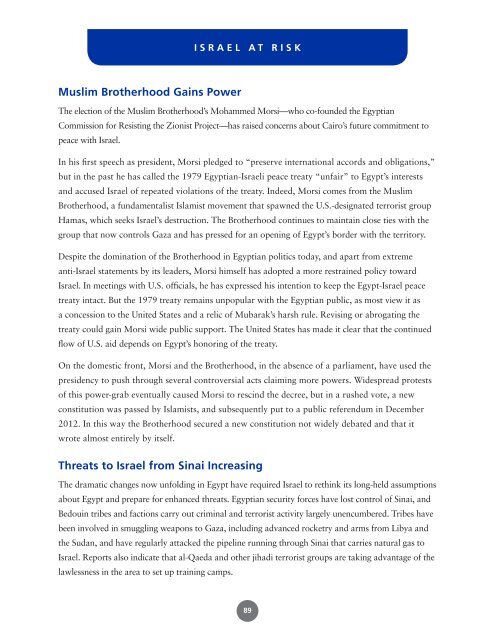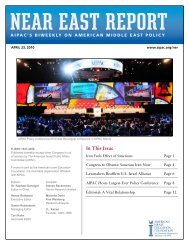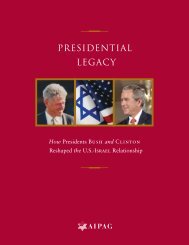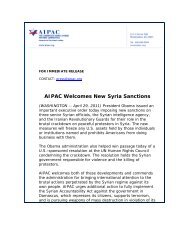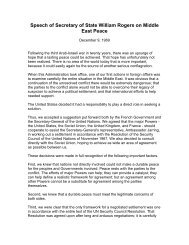2013 Briefing Book - Print Version - Aipac
2013 Briefing Book - Print Version - Aipac
2013 Briefing Book - Print Version - Aipac
You also want an ePaper? Increase the reach of your titles
YUMPU automatically turns print PDFs into web optimized ePapers that Google loves.
ISRAEL AT RISK<br />
Muslim Brotherhood Gains Power<br />
The election of the Muslim Brotherhood’s Mohammed Morsi—who co-founded the Egyptian<br />
Commission for Resisting the Zionist Project—has raised concerns about Cairo’s future commitment to<br />
peace with Israel.<br />
In his first speech as president, Morsi pledged to “preserve international accords and obligations,”<br />
but in the past he has called the 1979 Egyptian-Israeli peace treaty “unfair” to Egypt’s interests<br />
and accused Israel of repeated violations of the treaty. Indeed, Morsi comes from the Muslim<br />
Brotherhood, a fundamentalist Islamist movement that spawned the U.S.-designated terrorist group<br />
Hamas, which seeks Israel’s destruction. The Brotherhood continues to maintain close ties with the<br />
group that now controls Gaza and has pressed for an opening of Egypt’s border with the territory.<br />
Despite the domination of the Brotherhood in Egyptian politics today, and apart from extreme<br />
anti-Israel statements by its leaders, Morsi himself has adopted a more restrained policy toward<br />
Israel. In meetings with U.S. officials, he has expressed his intention to keep the Egypt-Israel peace<br />
treaty intact. But the 1979 treaty remains unpopular with the Egyptian public, as most view it as<br />
a concession to the United States and a relic of Mubarak’s harsh rule. Revising or abrogating the<br />
treaty could gain Morsi wide public support. The United States has made it clear that the continued<br />
flow of U.S. aid depends on Egypt’s honoring of the treaty.<br />
On the domestic front, Morsi and the Brotherhood, in the absence of a parliament, have used the<br />
presidency to push through several controversial acts claiming more powers. Widespread protests<br />
of this power-grab eventually caused Morsi to rescind the decree, but in a rushed vote, a new<br />
constitution was passed by Islamists, and subsequently put to a public referendum in December<br />
2012. In this way the Brotherhood secured a new constitution not widely debated and that it<br />
wrote almost entirely by itself.<br />
Threats to Israel from Sinai Increasing<br />
The dramatic changes now unfolding in Egypt have required Israel to rethink its long-held assumptions<br />
about Egypt and prepare for enhanced threats. Egyptian security forces have lost control of Sinai, and<br />
Bedouin tribes and factions carry out criminal and terrorist activity largely unencumbered. Tribes have<br />
been involved in smuggling weapons to Gaza, including advanced rocketry and arms from Libya and<br />
the Sudan, and have regularly attacked the pipeline running through Sinai that carries natural gas to<br />
Israel. Reports also indicate that al-Qaeda and other jihadi terrorist groups are taking advantage of the<br />
lawlessness in the area to set up training camps.<br />
89


